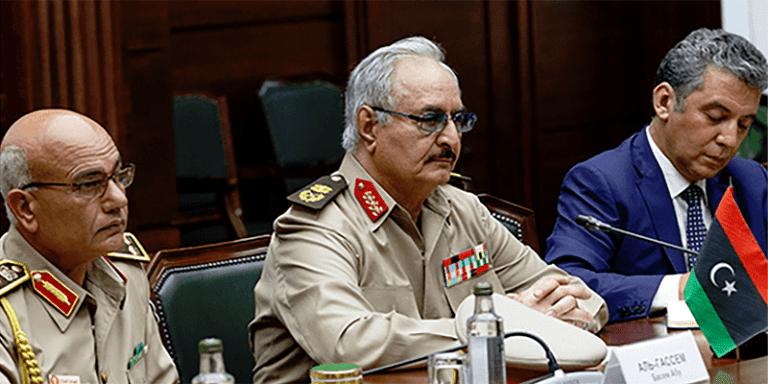
Libya is once again in the eye of the hurricane with renegade General Khalifa Haftar’s Libyan National Army (LNA) continuing his attack on the capital, Tripoli, and its defending militias. The World Health Organization reports that the clashes have so far resulted in 430 dead, at least 2,110 wounded, and 55,000 displaced, with many civilian casualties.
Haftar’s decision to attack Tripoli has surprised and appalled most local and international actors, including the United Nations and the European Union. What is remarkable is that many actors are surprised by Haftar’s initiative; indeed, he has been talking openly about a military solution since his ascent to power in the eastern province of Libya in 2014. The launch of Operation Karama against all Islamist groups in Benghazi was a turning point in the recent history of the country. It sanctioned the idea that no sacrifice is too big in the mission of getting rid of terrorists (or Islamists—Haftar uses the two terms interchangeably). The general never hid his plans to “liberate” the whole country and anoint himself its leader.
Haftar’s “Spoiler” Strategy
Haftar never participated wholeheartedly in the series of summits and conferences that were organized by the United Nations or by unilateral lone mediators. He joined the discussions but was always the first to leave, offering not-so-positive comments. His main method to delay or nullify the possibility of an agreement has been to demand that all Libyan armed forces be placed under his command. He knew that this would cross a red line with the counterparts who are wary of him. By setting the bar that high, Haftar de facto made it impossible to reach an agreement with Fayez al-Sarraj, the prime minister of the UN-recognized Government of National Accord (GNA). While paying lip service to the negotiations, Haftar proceeded—with the strong support of Egypt and the United Arab Emirates—to better equip and train his forces.
Haftar never participated wholeheartedly in the series of summits and conferences that were organized by the United Nations or by unilateral lone mediators.
The decision of the UN Secretary-General’s Special Representative in Libya, Ghassan Salamé, to hold a national conference in Ghadames on April 14-16 upset the general. He knew that the UN had persuaded Sarraj to recognize Haftar as the commander of the armed forces, while Haftar was expected to recognize a political role for Sarraj. He realized that if the conference took place and he was presented with the decision granting him command of the Libyan armed forces, there would be no acceptable way for him to ascend to full power. Reinforced by the news from some of his collaborators about the likelihood that some militias in Tripoli would defect to his camp, Haftar decided to play the card of a march on Tripoli. He thought he could send his troops very quickly inside the city, occupy main sites, and present the international community with a fait accompli.
The Unfolding Offensive
Things did not go as Haftar expected. The militias in Tripoli did not defect; on the contrary, they coalesced to resist “the eastern invaders.” The LNA troops who first moved to Tripoli were ambushed and many were captured. The situation on the ground after heavy fighting in the first two to three weeks has since been blocked and stalled. This has caused many observers of Libya to think that there will be a long stalemate. It is also true, though, that neither side can really afford a long war of attrition. Haftar’s troops are fighting more than 1,000 kilometers from their homes and bases in the east, and it looks very unlikely that they could receive the necessary support to fight in the difficult conditions of Libya. At the same time, the cohesion of the militias that defend Tripoli is always in question and a long war will exact a toll on them. The situation is now in a fragile equilibrium and the actions of external supporters may be decisive in tilting the war in favor of this or that side.
The situation is now in a fragile equilibrium and the actions of external supporters may be decisive in tilting the war in favor of this or that side.
The reaction of the international community has been appalling as well. While Italy reiterated its position in favor of Sarraj’s government, others such as France have been more ambiguous and acted to prevent a statement to be issued by the European Union, one condemning Haftar’s aggression. These actors were joined by Russia, whose veto in the UN Security Council blocked a resolution clearly identifying Haftar as the culprit and aggressor. After American Secretary of State Mike Pompeo originally called on Haftar to halt his attack on Tripoli, President Donald Trump made an about-face and actually called the general to approve his supposed counterterrorism efforts. Egypt and the United Arab Emirates, after an initial moment of shock probably because they were not aware of Haftar’s attempted blitzkrieg, backed the offensive and started replenishing his depots and facilitating the convoy of troops to the western battlefield. Qatar and Turkey are supposed to do the same for Sarraj, but it is not clear what, when, or how this support will materialize. So, there is a complex mosaic of alliances and rivalries at both the domestic and international levels.
No Chance for Negotiations in the Near Future
The United Nations and European Union, as well as many other international actors, keep repeating the views that “there is no military solution” and that both parties should “return to dialogue.” While this may appear to be the good and sensible thing to say for the various actors, in the context of today’s situation in Libya it does not mean anything. What negotiations? The UNSMIL (UN Support Mission in Libya)-led negotiations, with all their meetings in various capitals of the world, cannot be resumed. No leader in western Libya could sit at a table with Khalifa Haftar. There is no doubt about these facts.
For meaningful negotiations to occur, Haftar has to leave the scene and allow other eastern Libya personalities to come forth and participate in the process.
For meaningful negotiations to occur, Haftar has to leave the scene and allow other eastern Libya personalities to come forth and participate in the process. He had some support in Tripoli before his decision to invade the city. It is now clear that all his political capital has been squandered and opposition to him has grown tenfold. It is hard to believe that Haftar would voluntarily step down; if this were the case, then what negotiations are the various international actors talking about? It leaves only one conclusion, an ugly one indeed: that the battle on the ground has to continue until one side succumbs, or the parties find themselves in a painful stalemate which will force them to accept more meaningful compromises.
What Scenarios Could Develop from This Situation?
In case of a collapse of the defensive system around Tripoli and the incursion of the LNA into the city, negotiations would revolve around a conditional surrender which would also include Misrata and the other cities that fought alongside the GNA. This scenario, which sees the victory of the LNA and the establishment of Haftar as the leader of the country, will not bring stability. There is no way, given the amount of opposition that has been created by the attack and the consequent fights, that Haftar could control Libya’s west. The opposition to his rule is likely to be in the form of terrorism, guerrilla attacks, and other forms of resistance.
The second and opposite scenario would have many drawbacks as well. In fact, the defeat of the LNA may even result in further divisions and fragmentation. If defeated and forced to return to the east, it is unclear whether Haftar would survive such a loss of face. In the possibility of his demotion, it is not guaranteed that the LNA would survive under a different leadership. If it does, the new leadership could decide to cooperate with their western counterparts and negotiate a solution that could keep the country united with a strong decentralized system.
If, on the other hand, the LNA and the leadership of the east collapse and fragment into many local components, then totally different negotiations would have to be devised. They would need to be centered around the re-creation of state unity through the adoption of a bottom-up approach. This would be a difficult and long process, but a doable one. Such a scenario would be challenging for the western part of the country as well. The victory on the ground would have been achieved by the militias of Tripoli but also by the forces of Misrata. Would all of these actors find a way to coexist and continue the process of democratization of the political system? This is doubtful. It is more probable that they would start fighting with each other over their positioning and access to state resources. To avoid this negative eventuality the international community may have to step in with a plan of action that directly affects the various parties and maintains the progress toward a process of reconstruction of the political and economic system.
The third scenario is that of a long military stalemate, the subsequent paralysis of most political activity and the suspension of most—if not all—projects for the rebuilding of the country’s infrastructure and the reform of its economy. This situation would further deteriorate the well-being of the population and may eventually result in a humanitarian crisis if the provision of energy and water is blocked, either by willful acts of rival groups or simply by material degradation and lack of maintenance.
The international community and the United States first and foremost must understand that complying with the selfish interests of some regional actors will lead to tragic outcomes for all involved and will not bring any of the advantages wrongly sought.
None of these scenarios brings with it much in terms of hope for a better future for the country. Haftar’s foolish attack against the capital has unleashed dynamics that will be hard to adjust or control. The international community and the United States first and foremost must understand that complying with the selfish interests of some regional actors will lead to tragic outcomes for all involved and will not bring any of the advantages wrongly sought. It is necessary to find common ground and shared goals with a cohesive plan for resolving the various domestic grievances involved and helping the Libyan actors to overcome them in a constructive fashion. Only a strong collegial action by the international and regional actors interested in the resolution of the Libyan crisis can bring about a satisfactory solution. The pursuit of selfish interests will only bring further chaos and violence to all.

